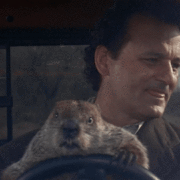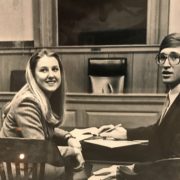Lawyer’s Hopeful Essays an Antidote To Modern Cynicism
For anyone who has ever fought in vain to quiet all the little voices in their head so they can get something accomplished, Sean Doyle offers an alternative: Let them speak.
That’s what Doyle, an attorney and consulting psychologist, has done in his new book of personal essays, “Mud and Dreams,” a collection of small stories and memories that build upon one another to form a powerful call to embrace the world with positivity and love.
In addition to a law degree from Loyola University, Doyle holds a master’s degree in positive psychology from the University of Pennsylvania. He currently serves as general counsel to RTP-based MCNC, a position he balances alongside writing, teaching, working as a well-being consultant and serving on NC BarCARES Board of Directors and the NCBA’s Professional Wellness Committee. All of these pursuits inform “Mud and Dreams,” a tidy book that is part memoir, part personal growth manual and impossible to read in public because it will make you cry like a small child.
The voices in “Mud and Dreams” echo from Doyle’s past, among them a juvenile delinquent who did him a good turn, a childhood friend with whom he cheated death, and an enthusiastic conference attendee with bracingly bad breath. The lessons he draws deftly illustrate truths that we don’t talk much about in an age defined by social media preening and childhoods wrapped in safety nets. Here, Doyle answers a few questions about the book and how he helps attorneys find balance and happiness.
Q: What prompted you to write this book at this time?
A: I’ve been really troubled about the levels of hostility, the levels of despair and cynicism that are out in the public in general. If you look at the data, people have lost trust in the government, corporations, the church – all the institutions that have always stabilized us. Then throw in everything we must deal with online, where anonymity makes it easy for us to act less humanely, and you’re not getting a real picture of the world. A lot of people are struggling. But we can demand more humanity from those around us and we can embrace everything that’s going on. We can actually find happiness and joy and meaning in spite of the challenges, hardships and struggles.
Q: What has the response been like?
A: Now that the book has been out and reviews are starting to come in, it’s been very humbling. The response has been very positive. I’ve had people I don’t know reach out and say, “It felt like you wrote this essay just for me,” or “I really needed this.” That makes it all worthwhile. If I can give something back to somebody that helps them, that’s just tremendously rewarding and valuable.
Q: One of the most memorable anecdotes described a surprising moment of peer pressure. You were out carousing with high school friends, and someone passed around a bag of psychedelic mushrooms, which you were tempted to try. But a kid with a bad reputation, whom you pseudonymously call Conner MacBride, stopped you by saying, “You are the only one in this room that has a chance. You are worth more than this.” What prompted you to include that story?
A: That moment was just so striking for me in that it came from the person in the room I would have least expected. It caused me to think over the years about what contributed to that. Conner was going through whatever he was going through, but why was he supportive of me? It highlighted for me the need to show respect for other people, and just being kind to others, regardless of what they may have done or what they’re going through.
Q: In another chapter, you recall the time you and a friend built a fire in the woods and put some shotgun shells in in to see what would happen. Fortunately, disaster skipped you that day. Why did this story make it in?
A: I wrote that when there something big in the news – I don’t remember exactly what – but somebody had done something, and there was a lot of criticism toward the teenager and the parents. I looked at that and thought “I’ve done so many stupid or mindless things. All of us are negligent, but to be negligent and unlucky – that’s the crime.” For example, how many times have we been looking at our phones while we are driving and looked up just in time? But when somebody else does that and has an accident, we’re critical. It’s easy to blame them and forget about the time that we were doing the same thing or something similar.
Q: How do you correct for that? How do you keep these ideas in the forefront of your mind?
A: At some point I recognized that all of us are all just doing our best. I have this image of the type of person I am, the type of person I want to be, and then I do something to violate that. It may have been done mindlessly or maybe there’s some circumstance that allows me to make an exception. I can hold my self-image intact because I know my exception, or that I was simply mindless. But when somebody else does the same thing, it’s easy to judge, to say they’re not kind or whatever the criticism is. When I had that realization I thought, “Let’s try to give people a pass because you don’t know what they’re going through.” Everyone of us a hypocrite to some extent.
Q: When you’re having conversations with lawyers about wellness and balance, are some points stickier than others?
A: When you look at the big picture of attorney wellbeing, lawyers as a group have higher-than-average rates of depression, job dissatisfaction and a whole other parade of horribles. I think a big part of that is that in our jobs, we have to look for what can go wrong. For example, if I’m dealing with a contract, and there’s an indemnity clause, I can’t just say, “Hey, don’t worry about it.” When we do that all day long, especially if it gets contentious, it is hard to turn off the cynical eye and skepticism There is a tendency for that to become a habit, where we starting looking around us and expecting bad things or noticing the bad things only. For lawyers, a big part of enhancing our wellbeing is having “flexible optimism.” We need to do our jobs and focus on the risks and pitfalls for our clients, but that’s not the whole of life. There’s a whole lot more out there. When we push away from our desks, we have to be vigorous and diligent about looking for the good things … And if we look for the good things, we’re going to see them because they y are out there all around us.
Q: This reminds me of the passage in the book where you talk about living with a sense of unbalance because an upset can come at any time. You write, “One day you will be in the middle of your routine, so busy with so many important things to do and the solid ground upon which you have stood for decades will crumble dry as dust.” How do you approach that sense of unbalance?
A: That’s a great point for lawyers especially because we tend to want to control everything. Our clients come to us so we can help solve their problems. There are certain things that we can protect against, but sometimes part of flourishing is recognizing that you can only prepare as much as you can, and do the things that you can do, but so much of life is out of our control.
For our own lives, the first step is recognizing that things are outside of our control and coming to accept that. The next step is realizing that you might never find out why something bad happened, and that that is OK. The third and most powerful step is about gratitude. Even with all this, as unjust and unfair as things can be, I can have a deep sense of gratitude that I’m just part of the whole thing.
Q: In an essay called “Changing the Narrative,” you write about being held back to repeat first grade and how it shaped your self-image for years: “… when school began again the following year, and all the children went out for recess, I saw my friends on top of the hill. That is where the second graders played. Looking up, I deduced they must be smarter than me.”
This is sometimes described as “impostor syndrome,” the feeling that you’re the only one in the room who doesn’t belong and soon everyone is going to find you’re not as smart as they think you are. How do you counsel attorneys on that?
A: After first grade, when I was held back, every time anything was hard in school, that was proof, it confirmed that thought I already had. I do think that’s something many attorneys feel from time-to-time. When I talk with lawyers about it, part of what we do is reality testing and helping them identify the contrary facts that are in their experience. We all have a confirmation bias. We notice the stuff that supports our chosen narrative. But there are other facts out there too. It wasn’t until years later when I looked back and thought, “If I’d been paying attention to that stuff, my whole narrative would have changed.”
Whatever it is that they are feeling, maybe that they don’t belong or they didn’t go to the best school or don’t know what they’re doing, there are going to be contrary facts you can help them find. There are multiple, credible interpretations of the details of our lives.
Q: What helped you change your own narrative?
A: It was a slow process. Things changed bit by bit. But there was a big shift when I graduated from the University of Pennsylvania with my master’s degree in psychology. I had already been a lawyer for 15 years. I had been in a big firm, but at times there was this feeling that I had somehow snuck in. And then some of the folks at Penn had some really nice, affirming things to say about my work. It felt like a validation.
I’d always has a sense that there was value in optimism and embracing the good around us. But those ideas are not always taken seriously. There is a cynical sense that it is just naive or that you are not paying attention to the “facts.” And now here’s a serious academic program that’s looking at the science behind it. My experience at Penn and in this field validated that gut feeling I had all along.
All of us are walking around with the stories we tell ourselves, often stories that emphasize where we have fallen short. And there are people around us who see the good things we had never noticed. We often never know how we may have touched others in meaningful and positive ways. Similarly, we might not realize that when we point out the good in others, that we may be helping to reshape their narrative as well.

 By
By 




